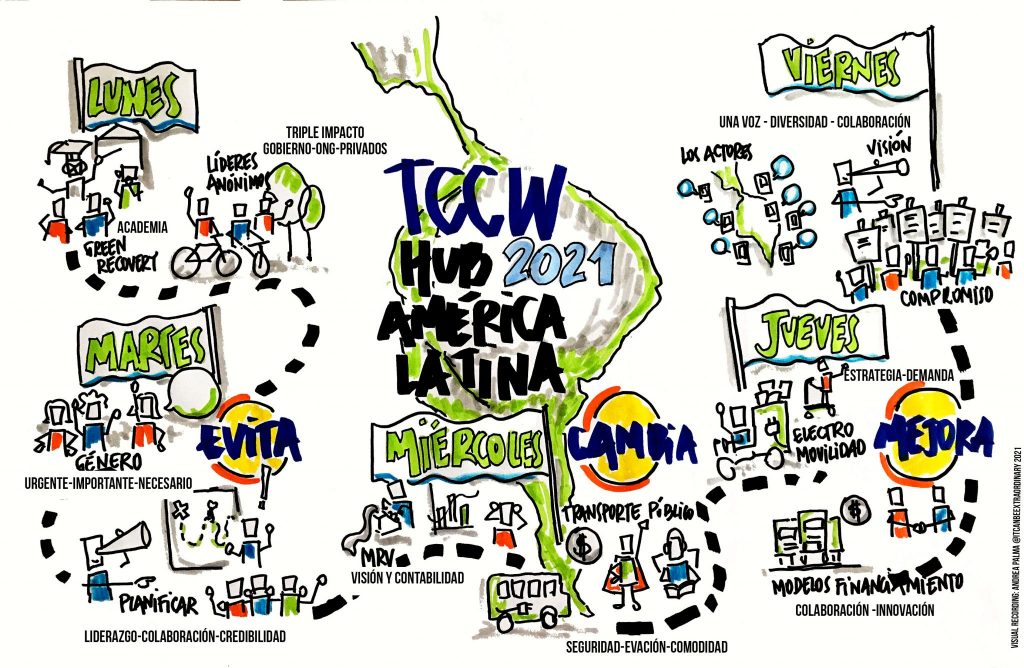
The fourth version of the GIZ Transport and Climate Change Week created a relevant space for global dialogue between actors in the sector and climate action, bringing together diverse voices and representatives from different parts of the world.
Besides the global programme organised from Berlin, Latin America developed an interesting programme designed by and for the region. As a result, it was possible to learn about reflections, experiences, and lessons learned in the Latin American region regarding sustainable transport and the decarbonisation of the sector.
The Latin American programme started on Monday with a discussion on green recovery and opportunities for sustainable transport. One of the main reflections of the session was that the current crisis represents a scenario of uncertainty, in which the authorities and the sector must be able to promote measures that facilitate a sustainable recovery, without putting people or the environment at risk. Recovery at any cost is not possible.
On Tuesday, the programme began with a discussion on gender and mobility which addressed the different urgencies faced by the sector in terms of incorporating a gender perspective in its work. Various women leaders of mobility initiatives in the region joined the discussion and presented successful national and local experiences. They reflected on the importance of incorporating the gender perspective more deeply, from the perspective of public space and the right to access it, considering the significant rates of violence and harassment they face today.
From the creation and implementation of public policies, we must recognise that the gender perspective must go beyond addressing sexual violence against women since the objective is to address the structural causes that generate this violence.
Ofelia Soriano, Ministry of Transport and Communications, Peru
The day continued with the session on active mobility and its incorporation into urban planning. Based on the conversation between the mayors of Cuenca and Ambato in Ecuador, the importance of having a long-term vision of the city was made visible. That it is essential to have very concrete steps to achieve the agreed objectives and to improve participatory processes to empower citizens of the positive changes that planning towards sustainable mobility generates.
Urban and mobility planning with a long-term vision that transcends administrations is important to achieve the sustainable development goals.
Javier Altamirano, Mayor of Ambato, Ecuador
The third day of the Latin American hub began with a session organised from Colombia, with the participation of various authorities and experts who addressed the relevance of MRV models and their relevance for decision-making in the sector.
In addition, on Wednesday, the session “Beyond electrification. Other hot topics for Public Transport in Latin America” presented the voice of various actors who addressed issues such as evasion, harassment, segregation, and the opportunities that open up from the modernisation of public transport systems.
The panel discussion “Towards clean and efficient heavy-duty vehicles” highlighted important issues on the relevance of cleaner and more efficient fleets – the challenges of health and air quality, as well as road safety.
The fourth day of the programme focused on “improving transport” and fuels topics. The session on efficient driving brought up a central point: efficient driving is one of the most cost-effective measures to reduce fuel consumption which is 40% of operating costs, which has an effect on maintenance costs and influences the attitude of drivers behind the wheel.
The day ended with over 120 attendees listening to a large panel of speakers who presented various perspectives of electromobility, especially focused on its financing and the infrastructure necessary for the installation of this technology.
Continue working on participatory processes to make citizens aware of the need to prioritise planning towards sustainable urban mobility.
Pedro Palacios, Alcade de Cuenca, Ecuador
Friday was the last day of the Latin American Hub programme, where the different representatives and participants were invited to reflect on the road ahead of the sector. This space was led by Carolina Chatril, from Sustentar Asociation and culminated with the commitment of the participants to sustainable mobility.
The Latin American hub of the Transport and Climate Change Week was an important meeting place. We had the opportunity to learn about the experiences, good practices, and projections that the transport sector has today in the region and projections to advance decarbonisation of transport in the region. The space was seen as a platform to lift a Latin American voice in transport, a message that includes a diversity of solutions to the same challenges.
 Illustration by Andrea Palma
Illustration by Andrea Palma